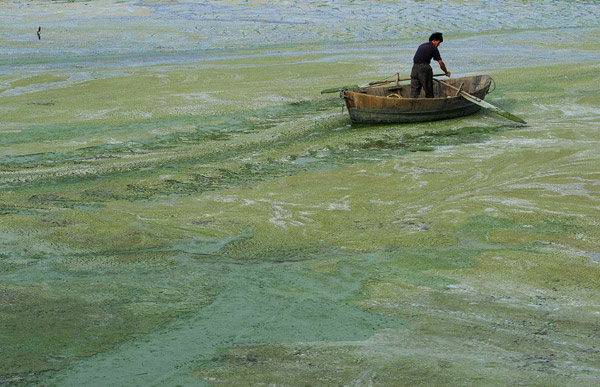Society
Fishing industry braces for oil-leak impact
By Wang Qian and Zhao Ruixue (China Daily)
Updated: 2011-07-05 07:25
 |
Large Medium Small |
BEIJING - Dead seaweed and rotting fish in the water around Nanhuangcheng Island in Shandong province, which is close to the site of a recent oil leak, suggest the local waters were polluted by the incident, say observers.
|
 A fisherman rows a boat in the algae-filled Chaohu Lake in Hefei, Anhui province July 3, 2011. Algae outbreaks have repeatedly hit the lake in recent years. [Photo/Agencies] |
"The oil leak will definitely influence the fishing industry nearby but we must carry out further investigations to see if the oil leak is the direct reason for the dead seaweed and fish," said a representative from the fisheries association in Changdao county. The county administers Nanhuangcheng Island.
"The environmental impact caused by the oil leak is long-term," the man named Xiao told China Daily on Monday.
Nanhuangcheng Island is about 40 nautical miles (74 kilometers) from the offshore oilfield in Bohai Bay where the leak originated.
A local fishmonger surnamed Gao told China Daily some pollution definitely exists in the area.
However, an official surnamed Song from Nanhuangcheng's local government told China Daily on Monday that the authorities have not yet received any reports of pollution.
The State Oceanic Administration plans to brief the media on Tuesday afternoon about the oil leak but has not commented on it so far.
According to a report from ConocoPhillips China, the company that operates the Penglai 19-3 oilfield from which the leak originated, an oil sheen was first seen on the surface of the sea "in early or mid June", a spokesperson from the China National Offshore Oil Corp (CNOOC) said in an e-mailed statement on Friday.
Cleanup work has almost finished and the source of the spill has been identified and brought under control, the statement said.
The affected area was only about 200 square meters, China National Radio quoted a representative from CNOOC as saying on Sunday.
The reason for the oil spill is under investigation but no injuries or reports of an impact on wildlife, fishing or shipping activities were detected, the report said.
Those claims were repeated by ConocoPhillips China spokesperson Donna Xue. She said in an e-mailed statement to China Daily: "The size of the sheen is under investigation. There have been no reports of any impact on wildlife or fishing and shipping activities."
Zhai Yuxiu, deputy director of the Yellow Sea fisheries research institute at the Chinese Academy of Fishery Sciences, said on Monday 200 square meters is a relatively small area, so the environmental impact is likely to be slight.
According to earlier media reports, the oil leak was not publicized by the authorities at the time it happened but was exposed on Sina Weibo, a popular Chinese micro-blogging site, on June 21.
The leak was not the first that the public was told little about. On May 13, an oil leak was reported to the North China Sea branch of the State Oceanic Administration but few details were made public. And on April 22, the CNOOC said that a problem detected in its oil storage equipment in Bohai Bay led to four oilfields being shut down, but again offered few other details.
CNOOC, which was founded in 1982, is a large State-owned enterprise and the largest offshore oil and gas producer in China. It produced 65 million tons of oil in 2010.
China Daily was unable to reach a CNOOC spokesperson on Monday.
Zhou Yan contributed to this story.
| 分享按鈕 |